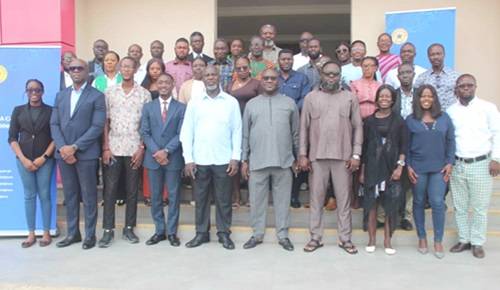🔥“Why I Believe This Journalism Training Could Actually Change Ghana’s Future”🔥
A few years ago, I stumbled into a situation I never saw coming. I was freelancing for a small news site, trying to build a name in media. One day, I got asked to cover a banking forum. No big deal, right?
Well… I tanked it.
Like, really messed it up.
I didn’t understand most of what the speakers said—terms like “monetary policy tightening,” “GDP projections,” “inflationary pressures”… My notes looked like alphabet soup. I felt like a fraud. And I remember thinking, Why the heck didn’t anyone teach us how to report on this stuff properly?
Fast forward to today, and I couldn’t help but smile when I heard that journalists in Ghana’s Eastern Region are finally getting trained in economic and financial reporting.
Not a flashy headline, I know—but trust me, this is huge.
-Reporting Numbers Isn’t Just Math—It’s Power
Here’s what most people don’t get: if you can’t report on money, markets, or budgets clearly, you’re not just missing out on a niche—you’re missing the story behind almost everything.
Fuel prices go up? That’s economics.
Galamsey destroying water bodies? There’s a financial motive behind it.
Government borrowing again? Yep—financial reporting.
And don’t get me wrong—most journalists are doing their best. But without training, how do you explain the budget deficit to someone who’s just trying to figure out why tomatoes are suddenly 30 cedis a basket?
-This Training? It's a Game Changer
The initiative—organized by the Bank of Ghana and the Ministry of Finance (I think)—is focused on teaching journalists how to break down complex topics into real, relatable stories.
I heard they’re covering stuff like interpreting budgets, understanding monetary policy, identifying financial misinformation (yes, that’s a thing), and interviewing economists without sounding lost.
Honestly? I’m a little jealous. I wish we had that back when I started.
And in my experience, it’s this kind of training that turns regular reporters into watchdogs—the kind that keep government and business honest.
-Real-Life Example? You Bet
Last month, my cousin messaged me freaking out about “Ghana’s debt distress level.” She said she read an article and had no clue what it meant. I read it too. It was full of jargon, passive voice, and, I swear, it used “macroeconomic imbalances” five times without ever explaining it.
Now imagine if that journalist had been part of this training. That story could’ve helped thousands of Ghanaians understand what’s happening with our economy—and why it matters.
Instead, it just… confused people. Or worse, scared them.
-I Might Be Wrong, But…
I really believe this kind of training is what we need more of—not just in the Eastern Region, but across the country. Journalism shouldn’t just inform. It should empower.
Because if you understand the economy, you understand how power works. Who has it. Who’s losing it. And what’s being done about it.
That’s what makes good reporting revolutionary.
-So Here’s My Big “What If…”
What if every regional newsroom had at least one person trained in economic literacy?
What if budget stories didn’t sound like textbooks, but like real conversations in tro-tros and chop bars?
What if, instead of making people feel small, our journalism made them feel smarter?
I don’t know. Maybe it’s idealistic. But after years of fumbling through financial jargon and watching important stories go untold, I’m hopeful.
Because this training?
It’s not just about covering the economy.
It’s about changing the conversation.
And I think we’re finally heading in the right direction.



